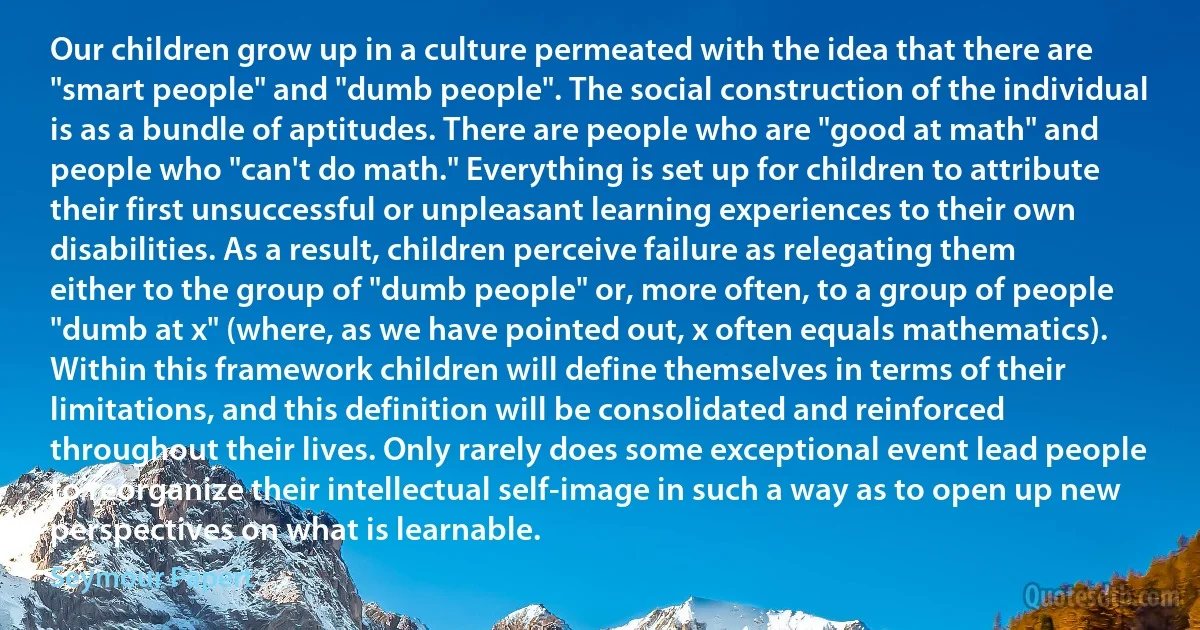
Our children grow up in a culture permeated with the idea that there are "smart people" and "dumb people". The social construction of the individual is as a bundle of aptitudes. There are people who are "good at math" and people who "can't do math." Everything is set up for children to attribute their first unsuccessful or unpleasant learning experiences to their own disabilities. As a result, children perceive failure as relegating them either to the group of "dumb people" or, more often, to a group of people "dumb at x" (where, as we have pointed out, x often equals mathematics). Within this framework children will define themselves in terms of their limitations, and this definition will be consolidated and reinforced throughout their lives. Only rarely does some exceptional event lead people to reorganize their intellectual self-image in such a way as to open up new perspectives on what is learnable.
Seymour PapertRelated topics
bundle children define definition everything exceptional failure good idea intellectual lead learning lives math mathematics open people result set smart way equalsRelated quotes
The shattering of modern culture is the result, on the plane of ideological struggle, of the chaotic crisis of these antagonisms. The new desires that are taking shape are presented in distorted form: present-day resources could enable them to be fulfilled, but the anachronistic economic structure is incapable of developing these resources to such ends. Ruling-class ideology has meanwhile lost all coherence because of the depreciation of its successive conceptions of the world (a depreciation which leads the ruling class to historical indecision and uncertainty); because of the coexistence of a range of mutually contradictory reactionary ideologies (such as Christianity and social-democracy); and because of the mixing into contemporary Western culture of a number of only recently appreciated features of several foreign civilizations. The main goal of ruling-class ideology is therefore to maintain this confusion.

Guy Debord
[T]he rapid march of scientific discovery...made me feel that it was quite within the realm of possibility that one day there might be an invention which would neutralise our [naval] superiority, and reduce us to equality with, if not inferiority to, our neighbours. ... In such an event our position would be one of complete helplessness in the face of an invader with a powerful army. ... We had two fundamental weaknesses in such a contingency. The first was that our army was too insignificant to stand up against the gigantic forces on the Continent. The second was that we were so overwhelmingly dependent upon overseas supplies for our food, that if these were cut off we should, within a few months, be brought to the very verge of starvation. It was this consideration amongst others that always led me to urge that we ought to devote more thought to the development of the resources of British soil.

David Lloyd George
In fact, the only person to rival Friedman for policy influence in the twentieth century is John Maynard Keynes, who had a strikingly different view of the role of government. Keynes was influential because he advocated more government intervention into what he perceived as poorly functioning private economies caught up in the Great Depression. In contrast to Keynes, Friedman put the main blame for the Depression on government failures, especially of monetary policy. Hence, the Depression did not make Friedman a fan of big government. He also found in the Federal Reserve's failure to prevent deflation an argument in favor of monetary rules. As the world evolved- with low inflation becoming the major mission of central banks and free markets and secure property rights becoming the main policies to promote economic growth-Friedman surely won the intellectual battle.

Robert Barro
Neither acquiescence in skepticism nor acquiescence in dogma is what education should produce. What it should produce is a belief that knowledge is attainable in a measure, though with difficulty; that much of what passes for knowledge at any given time is likely to be more or less mistaken, but that the mistakes can be rectified by care and industry. In acting upon our beliefs, we should be very cautious where a small error would mean disaster; nevertheless it is upon our beliefs that we must act. This state of mind is rather difficult: it requires a high degree of intellectual culture without emotional atrophy. But though difficult, it is not impossible; it is in fact the scientific temper. Knowledge, like other good things, is difficult, but not impossible; the dogmatist forgets the difficulty, the skeptic denies the possibility. Both are mistaken, and their errors, when widespread, produce social disaster.

Bertrand Russell
"To imitate Socrates” meant, in other words, to staunchly refuse imitation; refuse imitation of the person "Socrates”-or any other person, however worthy. The model of life Socrates selected, painstakingly composed and laboriously cultivated for himself might have perfectly suited his kind of person, but it would not necessarily suit all those who made a point of living as Socrates did. A slavish imitation of the specific mode of life that Socrates constructed on his own, and to which he remained unhesitatingly, steadfastly loyal throughout, would amount to a betrayal of his legacy, to the rejection of his message-a message calling people first and foremost to listen to their own reason, and calling thereby for individual autonomy and responsibility. Such an imitation could suit a copier or a scanner, but it will never result in an original artistic creation, which (as Socrates suggested) human life should strive to become.

Zygmunt Bauman
